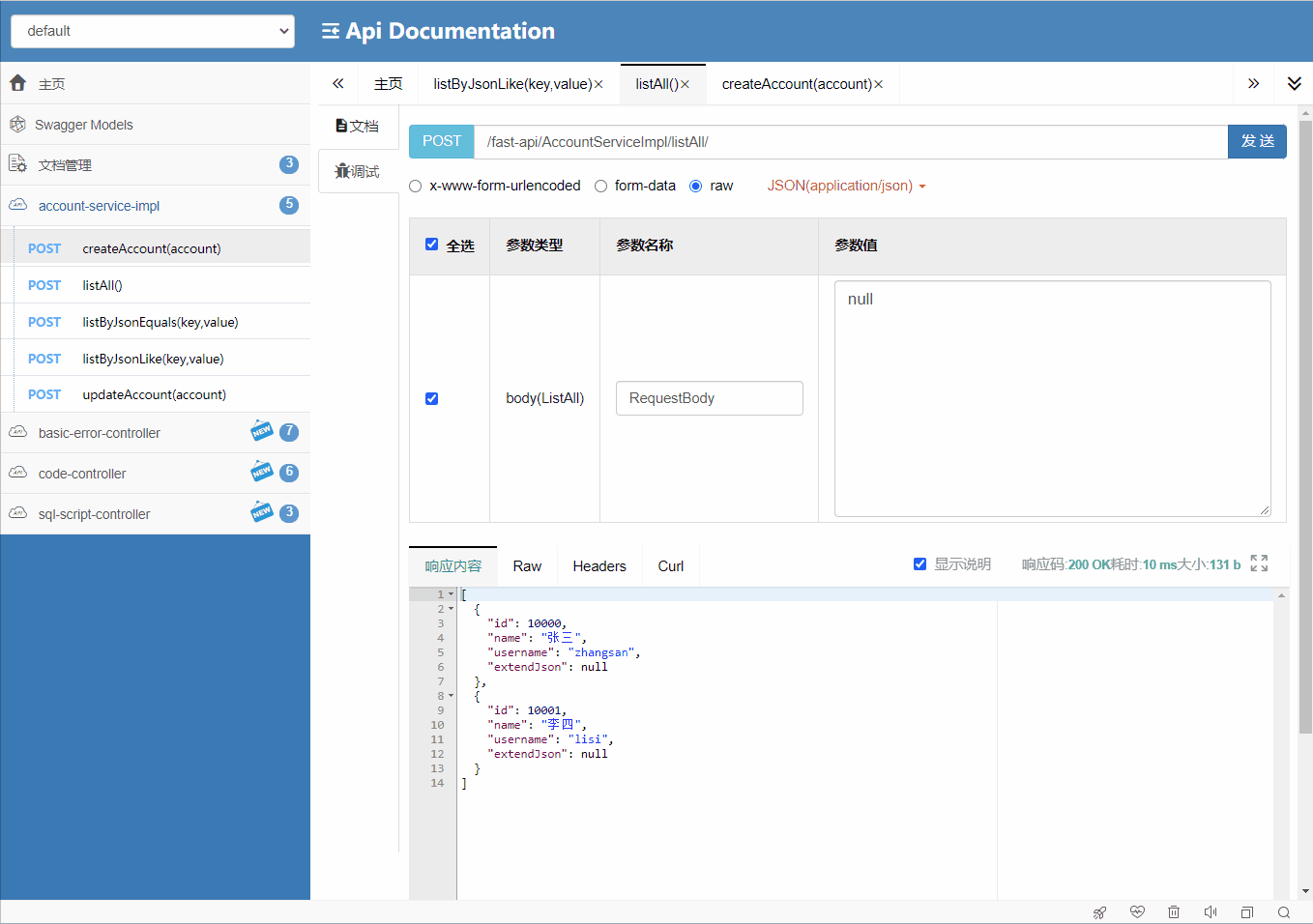SpringBoot mybatis-plus使用json字段实战指南
作者:张三疯不疯
1.前言
在springboot项目开发中,一般使用关系型数据库作为主库存储数据,有时候业务场景需要在既有的表结构上,扩展自定义业务信息. 这种场景下一般使用json类型存储。本文总结springboot项目中,借助mybatis-plus操作json实践方案
2.方案分析
2.1 为什么是json
JSON类型相对于传统的关系型结构,其具有数据本身对结构描述、动态扩展和嵌套等特性,能够更加自由地表示和存储数据
2.2 数据库的选择
json字段的存储依赖于底层选择的数据库, 有的关系型数据库已经支持json,比如MySQL5.7版本中,引入了JSON类型。如果没有特殊的json类型, 我们可以使用text类型存储json文本。因此要分两种情况分析. 这两种模式区别:
- 提供json类型数据库,在查询灵活程度上更高,比如可以针对json指定key的value进行查询。text之恶能作为普通文本匹配
- 提供json类型数据库,查询会部分依赖底层特殊查询语法. text则是通用的数据类型不存在该情况。
3. 实战
无论底层数据库使用text类型还是json类型。持久层使用mybatis-plus都要处理json与对象的映射问题。创建一个Account账号对象为例,增加一个extendJson作为存储扩展数据的json对象
@TableName(value = "account", autoResultMap = true)
public class Account {
@TableId(type = IdType.AUTO)
private Long id;
private String name;
private String username;
/**
* 注意!! 必须开启映射注解
*
* @TableName(autoResultMap = true)
* <p>
* 以下两种类型处理器,二选一 也可以同时存在
* <p>
* 注意!!选择对应的 JSON 处理器也必须存在对应 JSON 解析依赖包
*/
//@TableField(typeHandler = JacksonTypeHandler.class)
@TableField(typeHandler = FastjsonTypeHandler.class)
private JSONObject extendJson;
//setter/getter忽略
以上部分主要参考mp官网:https://baomidou.com/ >>字段类型处理器
3.1 使用text字段(h2数据库)
使用text字段测试json字段我们使用h2数据库进行测试
- h2版本: 1.4.200(该版本不支持原生的json字段)
3.1.1 建表语句
使用liquibase管理建表语句
<?xml version="1.1" encoding="UTF-8" standalone="no"?>
<databaseChangeLog xmlns="http://www.liquibase.org/xml/ns/dbchangelog" xmlns:ext="http://www.liquibase.org/xml/ns/dbchangelog-ext" xmlns:xsi="http://www.w3.org/2001/XMLSchema-instance" xsi:schemaLocation="http://www.liquibase.org/xml/ns/dbchangelog-ext http://www.liquibase.org/xml/ns/dbchangelog/dbchangelog-ext.xsd http://www.liquibase.org/xml/ns/dbchangelog http://www.liquibase.org/xml/ns/dbchangelog/dbchangelog-3.5.xsd">
<changeSet author="demo" id="account.createTable">
<createTable tableName="account" remarks="账号表">
<!--设置id自增 起始位置从10000 每次加1-->
<column name="id" remarks="账户ID" type="bigint" autoIncrement="true" incrementBy="1" startWith="10000">
<constraints primaryKey="true" nullable="false"/>
</column>
<!--用户名增加唯一索引-->
<column name="username" remarks="用户名" type="VARCHAR(32)">
<constraints nullable="false" unique="true" uniqueConstraintName="uniq_username"/>
</column>
<column name="password" remarks="密码" type="VARCHAR(32)"/>
<column name="name" remarks="姓名" type="VARCHAR(20)"/>
<column name="sex" remarks="性别" type="CHAR(1)"/>
<column name="phone" remarks="手机" type="VARCHAR(100)"/>
<column name="email" remarks="邮件" type="VARCHAR(100)"/>
<column name="create_time" remarks="创建时间" type="datetime(0)"/>
<column name="update_time" remarks="修改时间" type="datetime(0)"/>
<!-- <column name="extend_json" remarks="拓展字段使用" type="json"/>-->
<column name="extend_json" remarks="拓展字段使用" type="text"/>
</createTable>
</changeSet>
<!--loadData:加载 csv 文件到已存在的表中-->
<changeSet author="easy-log-demo" id="account.loadData" >
<loadData tableName="account" file="db/liquibase/csv/account.csv" >
</loadData>
</changeSet>
</databaseChangeLog>
3.1.2 数据操作与查询
text存储json的数据操作与查询与普通text操作无差别
@Service
public class AccountServiceImpl implements AccountService {
@Autowired
private AccountMapper accountMapper;
public void createAccount(Account account) {
account.setUsername(UUID.randomUUID().toString().replace("-", ""));
this.accountMapper.insert(account);
}
public Account updateAccount(Account account) {
this.accountMapper.updateById(account);
return this.accountMapper.selectById(account.getId());
}
@Override
public List<Account> listAll() {
return this.accountMapper.selectList(Wrappers.emptyWrapper());
}
}效果:

3.2 使用json字段(mysql数据库)
3.2.1 建表语句
使用liquibase管理建表语句
- MySQL使用版本: 大于等于5.7
<?xml version="1.1" encoding="UTF-8" standalone="no"?>
<databaseChangeLog xmlns="http://www.liquibase.org/xml/ns/dbchangelog" xmlns:ext="http://www.liquibase.org/xml/ns/dbchangelog-ext" xmlns:xsi="http://www.w3.org/2001/XMLSchema-instance" xsi:schemaLocation="http://www.liquibase.org/xml/ns/dbchangelog-ext http://www.liquibase.org/xml/ns/dbchangelog/dbchangelog-ext.xsd http://www.liquibase.org/xml/ns/dbchangelog http://www.liquibase.org/xml/ns/dbchangelog/dbchangelog-3.5.xsd">
<changeSet author="demo" id="account.createTable">
<createTable tableName="account" remarks="账号表">
<!--设置id自增 起始位置从10000 每次加1-->
<column name="id" remarks="账户ID" type="bigint" autoIncrement="true" incrementBy="1" startWith="10000">
<constraints primaryKey="true" nullable="false"/>
</column>
<!--用户名增加唯一索引-->
<column name="username" remarks="用户名" type="VARCHAR(32)">
<constraints nullable="false" unique="true" uniqueConstraintName="uniq_username"/>
</column>
<column name="password" remarks="密码" type="VARCHAR(32)"/>
<column name="name" remarks="姓名" type="VARCHAR(20)"/>
<column name="sex" remarks="性别" type="CHAR(1)"/>
<column name="phone" remarks="手机" type="VARCHAR(100)"/>
<column name="email" remarks="邮件" type="VARCHAR(100)"/>
<column name="create_time" remarks="创建时间" type="datetime(0)"/>
<column name="update_time" remarks="修改时间" type="datetime(0)"/>
<column name="extend_json" remarks="拓展字段使用" type="json"/>
</createTable>
</changeSet>
<!--loadData:加载 csv 文件到已存在的表中-->
<changeSet author="easy-log-demo" id="account.loadData" >
<loadData tableName="account" file="db/liquibase/csv/account.csv" >
</loadData>
</changeSet>
</databaseChangeLog>
3.2.2 数据操作与查询
mysql支持json类型因此借助特定的语法可以实现json精确查询及模糊查询
@Service
public class AccountServiceImpl implements AccountService {
@Autowired
private AccountMapper accountMapper;
public void createAccount(Account account) {
account.setUsername(UUID.randomUUID().toString().replace("-", ""));
this.accountMapper.insert(account);
}
public Account updateAccount(Account account) {
this.accountMapper.updateById(account);
return this.accountMapper.selectById(account.getId());
}
/**
* json 数据模糊查询
* @param key extend_json 中的json的key
* @param value extend_json 中的json的key对应value
* @return
*/
public List<Account> listByJsonLike(String key, String value) {
// QueryChainWrapper<Account> queryWrapper = new QueryChainWrapper<>(this.accountMapper);
LambdaQueryWrapper<Account> queryWrapper = Wrappers.<Account>lambdaQuery();
//json字段模式查询
queryWrapper.apply("JSON_EXTRACT(extend_json, '$." + key + "') LIKE {0}", "%" + value + "%")
.ge(Account::getId, 10000);
return this.accountMapper.selectList(queryWrapper);
}
/**
* json 数据精确查询
* @param key extend_json 中的json的key
* @param value extend_json 中的json的key对应value
* @return
*/
public List<Account> listByJsonEquals(String key, String value) {
LambdaQueryWrapper<Account> queryWrapper = Wrappers.<Account>lambdaQuery();
//json字段精确查询
queryWrapper.apply("JSON_EXTRACT(extend_json, '$." + key + "') = {0}", value);
return this.accountMapper.selectList(queryWrapper);
}
@Override
public List<Account> listAll() {
return this.accountMapper.selectList(Wrappers.emptyWrapper());
}
}
- 效果:测试json内部字段模糊查询

4. 附录
4.1 MySQL JSON索引用法
TODO MySQLJSON索引用法介绍
4.2 mybatis-plus json查询用法
public class YourService {
@Autowired
private YourMapper yourMapper;
public YourEntity getByJsonKey(String key, String value) {
QueryWrapper<YourEntity> queryWrapper = Wrappers.<YourEntity>lambdaQuery()
.apply("json_data->'$.key' = {0}", value);
return yourMapper.selectOne(queryWrapper);
}
}
在上述示例中,.apply(“json_data->‘$.key’ = {0}”, value) 中的 {0} 将会被 MyBatis-Plus 自动处理为预编译参数,保证了 SQL 的安全性。
请确保你的 MyBatis-Plus 版本支持 .apply() 方法,该方法可以用于执行自定义的 SQL 查询条件。
5. 参考文档
总结
到此这篇关于SpringBoot mybatis-plus使用json字段的文章就介绍到这了,更多相关mybatis-plus使用json字段内容请搜索脚本之家以前的文章或继续浏览下面的相关文章希望大家以后多多支持脚本之家!
您可能感兴趣的文章:
- SpringBoot同时集成Mybatis和Mybatis-plus框架
- SpringBoot+MyBatis-Plus实现分页示例
- Springboot整合mybatis-plus使用pageHelper进行分页(使用步骤)
- SpringBoot+MyBatis-Plus实现分页的项目实践
- springboot集成mybatis-plus全过程
- Springboot集成Mybatis-plus、ClickHouse实现增加数据、查询数据功能
- springboot项目中mybatis-plus@Mapper注入失败问题
- springboot+mybatis-plus实现自动建表的示例
- SpringBoot中使用MyBatis-Plus实现分页接口的详细教程
- springboot3.2整合mybatis-plus详细代码示例
- 全网最新springboot整合mybatis-plus的过程

